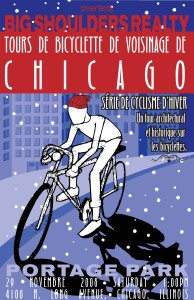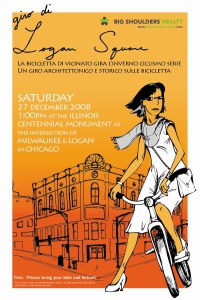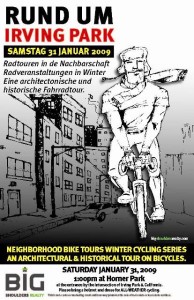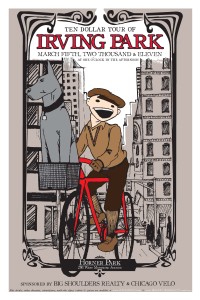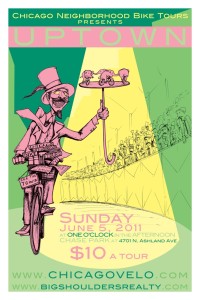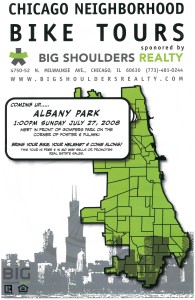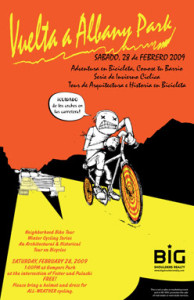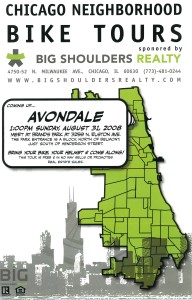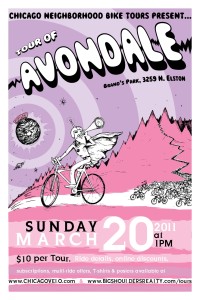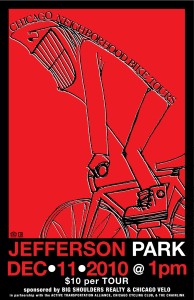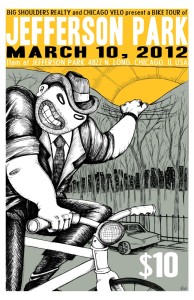Chicago’s Community Area #15, Portage Park which is a thriving residential community and neighborhood on Chicago’s Northwest side just 9 miles from downtown. Annexed to Chicago in 1889, Portage Park offers the wonderful duality of city living and convenience with a real neighborhood-based residential community. Centered on the namesake park within the community and neighborhood, this area was part of a portage for Native American tribes and later by European explorers and trappers. Riders will also get to examine fantastic buildings designed by legendary names such as Walter Burley Griffin, Dwight Perkins and Arthur Hussander.
Logan Square, Community Area no. 22 is located 5 miles from the loop on Chicago’s near Northwest side. Logan Square is home to exquisite mansions along its historic boulevards with side-streets lined with simple workers’ homes and 2-flats. It is host to homey dive bars and haute cuisine hot spots. A particularly funky strip of Milwaukee forms its main commercial district, immediately adjacent to its quiet tree- lined residential streets. Exhibiting a wide variety of styles and a host of wonderful examples, it is also an architectural treasure trove. Tour Stops on the tour will include the Logan and Congress Theaters, the William Zimmerman designed field house at Holstein Park, the Logan Square Auditorium, St. Hedwigs, St. Mary of the Angels and the Norwegian Church. The tour will also explain and explore the Boulevard System, and riders will get a chance to see some of the most amazing mansions in all of Chicago.
Irving Park, Chicago Community Area #16 sits 7 miles northwest of the Loop. Prior to being annexed to Chicago, the suburban communities that make up today’s Irving Park Community Area fell outside the city’s post-fire ban on wood-frame construction. The result is a present-day community rich with some of the oldest surviving construction in the city. Between 1895 and 1914 more than 5,000 new buildings, including 1,400 multifamily buildings were erected in this period of significant architecture development creating one of the greatest built environments in all of Chicago. It features comfortably nestled neighborhoods such as the Villa, (a registered National and City Historic Landmark), Old Irving, Independence Park and Grayland. On the tour, we will take in beautiful works of architecture such as Dwight Perkins’ Carl Schurz High School, the Henry V. Peters House by Walter Burley Griffin, St. Viator by Charles Wallace and dozens of other truly special buildings.
Uptown, Chicago Community Area #5 sits 6 miles directly north of the Loop. Uptown can boast of a rich history that is equal parts ritzy and ragged. The community has thrived during the glory of the jazz age and suffered mightily during the Great Depression. Uptown was once the hub of the early American Movie industry. Its ornate theaters, grand ballrooms, nightclubs, apartment buildings, mansions and central commercial district are amongst the finest architectural masterpieces in the city. Come join us for a revamped Tour of Uptown.
Community Area #14, Albany Park sits 8 miles northwest of the Loop. Join us on a historical and architectural tour of the community to discover how it grew from rural farmland into a vibrant, urban neighborhood of sturdy brick Chicago bungalows that today is one of the most diverse in the United States. A ride through the streets and neighborhoods of Albany Park will also reveal exciting and unique commercial districts and well-planned and plentiful green space. This tour will be at a leisurely pace with frequent stops and break for refreshments after about 2 hours – cyclists can leave after the break or continue on the tour as they wish.
Avondale, Chicago Community Area 21 sits 6 miles northwest of the Loop. Once part of a vast expanse of prairie, the installation of the Old Northwest Plank Road, today’s Milwaukee Avenue, helped spur business and development and ushered in many years of prosperity. Avondale was annexed to Chicago in 1889 and grew rapidly as city improvements such as paved roads, electric street car lines and the Logan Elevated line contributed to a population that swelled to almost 50,000 by 1930. Due to an abundance of clay in the pits near the river, a brick industry developed and the working class residents built some of the most sturdy and beautiful examples of masonry construction in the city. As a result, the area is ripe with rich examples of architectural beauty.
Jefferson Park, Chicago Community Area #11 is 10 miles northwest of the Loop. Nicknamed, the “Gateway to Chicago”, farmers once came from far and wide to sell their goods in Jefferson, named to honor Thomas Jefferson. Jefferson’s ideal location began as two Native American trails, grew to include the area’s earliest toll plank roads, and was thereafter augmented by rail and commuter lines. Today the area has a population of over 40,000, a tremendous amount of green space, historical homes and buildings throughout, and a namesake park on the National Register of Historic Places. Hop on your bike to visit an extra and intra-urban experience that barely feels like Chicago at the same time that it typifies it.
Chicago’s Community Area #15, Portage Park which is a thriving residential community and neighborhood on Chicago’s Northwest side just 9 miles from downtown. Annexed to Chicago in 1889, Portage Park offers the wonderful duality of city living and convenience with a real neighborhood-based residential community. Centered on the namesake park within the community and neighborhood, this area was part of a portage for Native American tribes and later by European explorers and trappers. Riders will also get to examine fantastic buildings designed by legendary names such as Walter Burley Griffin, Dwight Perkins and Arthur Hussander.
Logan Square, Community Area no. 22 is located 5 miles from the loop on Chicago’s near Northwest side. Logan Square is home to exquisite mansions along its historic boulevards with side-streets lined with simple workers’ homes and 2-flats. It is host to homey dive bars and haute cuisine hot spots. A particularly funky strip of Milwaukee forms its main commercial district, immediately adjacent to its quiet tree- lined residential streets. Exhibiting a wide variety of styles and a host of wonderful examples, it is also an architectural treasure trove. Tour Stops on the tour will include the Logan and Congress Theaters, the William Zimmerman designed field house at Holstein Park, the Logan Square Auditorium, St. Hedwigs, St. Mary of the Angels and the Norwegian Church. The tour will also explain and explore the Boulevard System, and riders will get a chance to see some of the most amazing mansions in all of Chicago.
Irving Park, Chicago Community Area #16 sits 7 miles northwest of the Loop. Prior to being annexed to Chicago, the suburban communities that make up today’s Irving Park Community Area fell outside the city’s post-fire ban on wood-frame construction. The result is a present-day community rich with some of the oldest surviving construction in the city. Between 1895 and 1914 more than 5,000 new buildings, including 1,400 multifamily buildings were erected in this period of significant architecture development creating one of the greatest built environments in all of Chicago. It features comfortably nestled neighborhoods such as the Villa, (a registered National and City Historic Landmark), Old Irving, Independence Park and Grayland. On the tour, we will take in beautiful works of architecture such as Dwight Perkins’ Carl Schurz High School, the Henry V. Peters House by Walter Burley Griffin, St. Viator by Charles Wallace and dozens of other truly special buildings.

